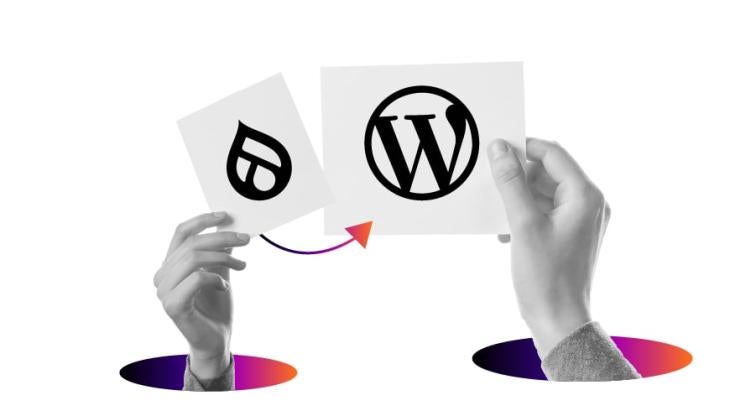McKenna Regets, Manager of Community Program, Pantheon Reading estimate: 7 minutes
Pantheon Hero Spotlight: James Tryon, Co-Founder & Wapuu Wrangler
What pop culture creature has yellow fur, a tail, shiny black eyes, and delights geeks and nerds around the world?
No, not the electric mouse from the Pokemon series. I’m talking about Wapuu, the unofficial WordPress mascot.
Image

James Tryon is one of the folks helping to spread the Wapuu spirit throughout the WordPress community. In addition to his agency work as a developer, he helps run a site that archives and promotes Wapuu, creates merchandise, and designs new Wapuu.
We think James’ work in uniting and strengthening the community—plus the adorable Wapuu he made for us—more than qualifies him to be a Pantheon Hero.
We sat down with James to hear about his history with the WordPress community, his philosophy of web development, and more.
What do you consider your primary involvement with WordPress and the WordPress community?
Well, like a lot of people, I run a small WordPress agency. But as far as what I actually do in the community, I help run Wapu.us, which is the archive of all things Wapuu for all the different WordCamps. If I'm ever at an event or a WordCamp, I'm there promoting Wapu.us. I don't ever go on behalf of my agency.
I get to help a lot of WordCamps around the world. So, it's neat to see swag that you’ve helped to design show up on Twitter from Asia or Australia. And, it's even cooler to make things with your hands—physical objects you can see people actually using, passing around, tweeting about. It’s exciting!
For those not familiar with Wapuu, what is its… let’s say, origin story?
Technically, Wapuu is the “unofficial mascot” of WordPress. It’s unofficial because, if it were official, they would have to trademark it, which could compete with the GPL. And then they would have to enforce that trademark. So not everyone would be able to utilize it to the fullest extent.
So, Wapuu is the unofficial mascot. He began life at WordCamp Tokyo in 2009. Matt Mullenweg was asking Japanese users how they could promote WordPress over there, and they said they wanted a mascot. Kind of like how Firefox had the fox mascot, it was hugely popular over there.
Kazuko Kaneuchi made the initial illustration, and she gave it to the WordPress community as a gift. Today, it’s distributed under the GPLv2 license, so anyone can remix it.
It’s been embraced by more and more WordCamps around the world; every time they have a special theme or a new style, their Wapuu will mimic that. Now, even companies will make their own versions for their WordPress-based businesses.
Yes, you have made a few for us, including the first (we broke new ground!) standing Wapuu. How did you get started with the WordPress community in the first place?
It was back in 2007. We were building our own versions of shopping carts off our own CMS. As we were doing more work, someone said, “You guys are crazy. Why are you doing this by yourself? There's already something out there.” They introduced us to the world of WP eCommerce and we started using it, in conjunction with WordPress. We transitioned over to WordPress full time.
We started getting involved in the WordPress community in 2009. That's when we first officially started helping. We had our first WordCamp Orlando here, we started having official meetups, and we tried to get pretty involved with the local community.
It kind of forked out of our BarCamps. You know, we have a lot of BarCamps here. Two times a year we were having an unofficial impromptu conference. And, from that, we started growing a large WordPress community and then having our own WordPress meetups and camps.
What do you like best about the WordPress community?
I find that they're really accepting. It's the people; it's the encouragement that comes along with the people. It's their willingness to help and give back.
Our communities in Florida are pretty strong when it comes to WordPress, so it feels like a home. It feels like these are real people that care about you and your projects. We have Slack channels where people are just hanging out and checking in with each other throughout the day.
So, it's really that community, the friendships you build from it and the real lift that comes along with people actually trusting, caring and offering to help. You know working in different industries, people aren’t willing to give you advice if you’re a potential competitor.
But in the WordPress community, everyone will sit down at the table and just openly tell you how they're doing things, help educate you, or help improve your situation, just because. And these are people who get paid hundreds of dollars an hour, but they do it for free. I think that's what draws me to it.
The WordPress community fills that need to have a place to belong. Sometimes we’re all a little off the wall, a little odd. We’re all unique individuals, but the WordPress community seems to have a place for us all.
Does that sense of community extend to your team at Easily Amused? How do you work together?
Yeah, open communication is what we find to be the easiest and best solution. We try to work agile as much as possible. We hold daily scrums. We use Asana for communication, keep really organized project management notes, and use Slack for communicating throughout the day.
And then we also co-work: We literally will just turn on a Google Hangout and work for hours on our own projects. And you know, people are welcome to come in and out, and we're just chatting about nonsense, what we're working on, and deliverables. So yeah, communication, followed by setting expectations.
I think after years of doing what we're doing, the biggest thing I've learned is setting proper expectations of how much time it really takes to do certain things. For example, a whole page really does take 30 hours, from wireframing to creating content to multiple design revisions. I used to think you could get it done in eight hours, and that’s crazy. You can’t set those false expectations. It's dangerous for the project. It's unhealthy for the team.
So as a whole, we try to be more reasonable with estimates and keep the lines of communication open. If we encounter a problem, we report back to the client as soon as we can. And we schedule it with a proper solution or what we think might be a solution and a possible time frame to deal with it. We really try to be as open and transparent as possible.
Not to go fishing for compliments, but… how does Pantheon support your dev style?
We were some of the first people to get WordPress working on Pantheon. So, I feel like Pantheon has a special place in my heart; we’ve been involved for so long. And you’ve also been sponsoring Wapuus, which is another way to my heart. We have these enameled pins we can give away at camps, and a lot of that comes from Pantheon support. It allows us to give back to the community and Five for the Future.
On a more practical side, we really enjoy the workflow, from a multidev standpoint, with the multiple staging environments. The fact that we can deploy code and not worry about, honestly, the clients messing it up. And if something breaks, there’s likely a rollback we can deploy from the repository.
It's been really nice for working with multiple teams on larger features. Overall, it's been a pleasure to work with.
We have had some sites that were really high traffic, but Pantheon structured the infrastructure to hold it. We were supporting these big blog networks but still seeing amazing load times, and it handled the traffic really well.
I don't have to have a dedicated sysadmin on my team. It saves me money. It saves me at least two full-time employees to just use your service, and counting.
Do you see WordPress development, even web development in general, changing right now? What do you think it will look like in five years?
Yeah, I think it's going to be more of what's already happening. As an agency, you know, we sell websites. But we're not really selling websites; we're selling a solution. We're talking with our clients and figuring out what their needs are.
I think it's going to be less hands-on coding and more problem solving. For a long time, I was avoiding page builders—not that they're bad. It's just I felt like they were cheating.
But I realized that by accepting the page layout — it's not always the best code, but you spend a lot less time developing it. That gives you more budget to work on more important things like content strategy or goal planning, or have better conversions or optimization at the end.
It opens you up to do a lot more for your clients. With the evolution of things like Gutenberg, and more of these page builders, everyone wants to become a site builder, which is hopefully what Gutenberg is planning on being.
In just the WordPress world, I think people are going to become more problem solvers than developers. Or, they're going to make that gap a little wider between the hobbyist and the developer, but empower the hobbyist a lot more.


.png.jpeg?itok=tTQnJfls)